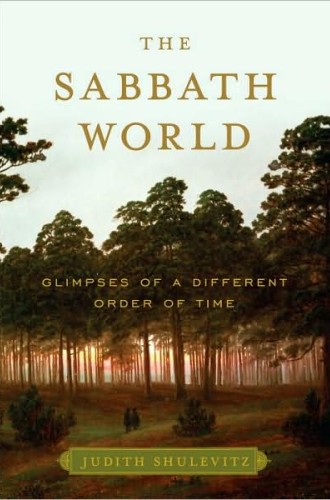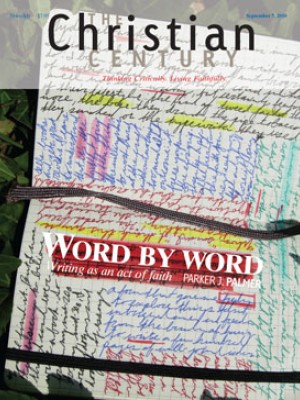A review of The Sabbath World
As the pace of life in the information age accelerates, complaints about how Americans live in time resound across the land. We long for something better, we say. And yet I sometimes wonder: When we complain about how busy we are, are we actually boasting of our importance? When we purchase devices that predictably lure us into working even harder, yet claim that freedom is what we seek, are we kidding ourselves? When we read (or even write) a book on the Sabbath—a growth industry in recent years—are we really open to the possibility of unplugging and entering into a different order of time? In the corners of our minds, aren't we also worried about what we would miss or concerned that we would chafe under the proscriptions that unplugging would entail?
Judith Shulevitz, the daughter of Jewish parents who disagreed with each other about the value of Sabbath observance, brings a lifetime of ambivalence to this book about time and its discontents. She is deeply attracted to the idea of the Sabbath. At the same time, she confesses, she has always resisted obeying rules and accepting constraints, traits she attributes to both American culture and her own restless spirit. Her disdainful teenaged self; her "willful, authority-baiting" self; her lit-crit self; her "grandiose, ambitious, jealous" self: all of these have lured her away from Sabbath observance. Another self has also been present all along, however. Shulevitz yearns for rebirth, for paths of righteousness and for rituals—the traditioned forms that commemorate "the ungovernable reality of God."
Read our latest issue or browse back issues.
In The Sabbath World, a philosophically minded journalist interweaves a wide-ranging investigation of the Sabbath with stories of her own persistent struggle. The result is a meandering, lyrical excursion through the past, with pauses along the way for reflection. A moving account of the Sabbath in postexilic Judaism provides an opportunity to ponder community and the troubled boundaries that sometimes preserve it, for example. A wonderful chapter on "the scandal of the holy" probes Genesis, the books of the Maccabees and rabbinic midrash for clues about what in the divine order and the human condition requires that this day be set apart. Hannah Arendt weighs in as well.
A range of modern responses also appears. Romantic poets found Sabbath blessing in days spent in nature. Stalin, on the other hand, tried to abolish shared days of rest altogether, replacing the seven-day week with a five-day nepreryvka, a state-enforced cycle of continuous work. We might wonder whether certain present-day trends echo this communist "reform."
Gradually Christianity finds an important place in this deeply Jewish book. To be sure, Shulevitz criticizes the anti-Jewish polemics that have marred Christian discourse on the Sabbath since the second century. What she finds more interesting, however, is Christians' attraction to sabbatarianism. Especially intriguing for her are the Transylvanian Szombatosok (Saturday people), who adopted seventh-day sabbatarianism in the 16th century and then developed close ties with Sephardic Jewish teachers. During the 19th century, those who remained were at last permitted by the Christian state to convert to Judaism; some of their descendants would die at Auschwitz.
Shulevitz also sees a kindred spirit in a New England Puritan divine, Thomas Shepard, whose theological defense of the Lord's Day laid a foundation for "the American Sunday," a social custom whose contemporary endangerment she regrets. In light of these and other appreciative accounts of Christian Sabbath-keeping, it is odd that she does not engage the substantial literature on the Sabbath written by Christians in recent years.
Throughout the book, vivid and varied portraits of the Sabbath stir up appreciation for the holy day of rest. Yet ambivalence is always just a page turn away. Shulevitz frequently notes how "weird" many of our sabbatarian forerunners were, how distant from what we now take for granted. The Sabbath rituals of the Kabbalists? "Anyone watching these proceedings who was not familiar with their mythological depths would surely have thought himself in the company of madmen." The Reformation-era debate over Saturday versus Sunday? "It is hard for the modern mind to grasp how life-threatening such abstruse distinctions could be." The cumulative effect of surveying the long history of the Sabbath? "I still like the idea of the fully observed Sabbath more than I like observing it."
In the end, however, this back-and-forth must be resolved. The Sabbath is not an idea but a day, and neither the author's nor the reader's interest is based on idle curiosity. Just thinking about the Sabbath is not enough. "We have to commit ourselves to holy time before it will oblige us by turning holy." Further, families and communities must make the commitment together, moving beyond individual preferences into the space of shared ritual. This day comes to those who embrace it already adorned with blessings and songs, with texts and customs and gatherings.
When Shulevitz finally discloses what she, her husband and their children actually do on the Sabbath, she is apologetic. By strict Jewish standards, she says, they keep the Sabbath "only halfway." To me, however, the family's candle lighting, walks to synagogue and relaxed meals together sound good enough. Indeed, they sound wonderful.
For a busy family living in a diverse, bustling city, remembering the Sabbath requires constant negotiation. Soccer practices cut into synagogue attendance for Shulevitz's son and husband, and she suspends her own resolve to renounce cell phone and e-mail on the Sabbath when she "really, really" needs to use them. Still, between the lines of her modest self-report I read a deep sense of connection with community and tradition, and perhaps even with God (she is deliberately more reticent on this point than a Christian author would likely be).
Some readers will condemn such flexibility as a mark of failure and hypocrisy, but I find Shulevitz's frankness about the challenges she faces and the imperfections she allows quite helpful. For one thing, it is rhetorically effective, inviting readers who yearn for the Sabbath to undertake similar deliberations of their own.
More important, this frank approach places in the foreground a crucial aspect of what it means to belong to a religious tradition in the 21st century, not only on the Sabbath but every day. Coercion of religious practice is not an option, and withdrawal into enclaves of the like-minded appeals to few. For most Christians and Jews, a life lived in and for the world is a path that is not only necessary but also good, and potentially pleasing to God.
Those who tread this path need to think, negotiate and sometimes improvise. On one side lies isolating rigidity; on the other, sloppy openness to every distraction. If we avoid falling into either ditch, we do so by having good traveling companions—ancestors whose texts, questions, accomplishments, rules and improvisations offer tested glimpses into a different order of time, and present-day communities within which to learn, celebrate and pray for guidance. Even when they are messy, the on-the-ground practices of such communities, embraced humbly yet boldly, bear help, challenge, companionship and grace.
By urging readers gracefully and self-critically toward such companionship, The Sabbath World makes an important contribution to literature on the Sabbath while also providing an exceptionally thoughtful reflection on religious life itself. I hope that Shulevitz's honesty will encourage similar honesty on the part of Christians as we help one another to discern the contours of faithful living in the information age.






